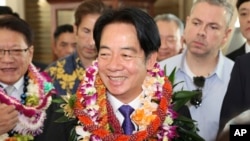China on Thursday urged the United States to "stop sending wrong signals" over Taiwan, after the announcement that Republican U.S. House Speaker Mike Johnson held a call with the self-ruled island's President Lai Ching-te.
Lai is currently visiting the American territory Guam during a Pacific tour that has angered China.
Taiwan's Presidential Office confirmed to AFP Thursday that the call had taken place, without elaborating on the discussion.
Beijing views Taiwan as part of its territory and has refused to rule out the use of force to bring the self-governed island under its control one day.
Beijing's foreign ministry on Thursday urged Washington to "deliver on the promises of American leaders not to support Taiwan independence, to stop interfering in China's internal affairs, and to stop sending wrong signals to Taiwan separatist forces."
Spokesperson Lin Jian said the U.S. should "clearly recognize the serious danger that separatist acts of Taiwan independence pose to peace and security across the Taiwan Strait."
"The Taiwan issue is the very core of China's core interests," he said at the regular press briefing, adding that China would take "resolute and effective measures" to defend its sovereignty.
The United States does not have official diplomatic ties with Taiwan but has an arrangement to provide the island with the means to defend itself.
In a separate statement on Thursday, China's foreign ministry announced sanctions on U.S. companies and individuals for selling arms to Taiwan.
The sanctions target 13 firms engaged in the production of drones, unmanned aerial systems, and other military products.
They also cover six top executives at companies including Raytheon and BAE Systems.
The sanctioned companies will have their assets in China frozen and be banned from trading with Chinese firms, while the executives will also be banned from entering China, including Hong Kong and Macau, the statement said.
